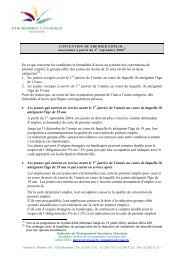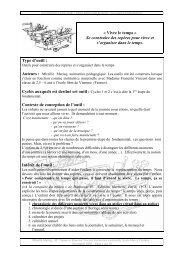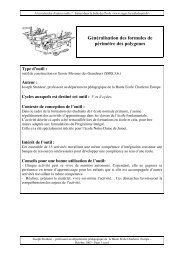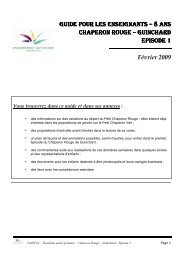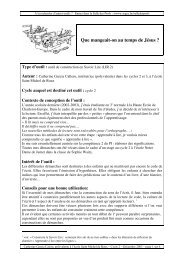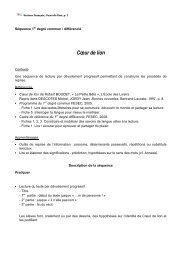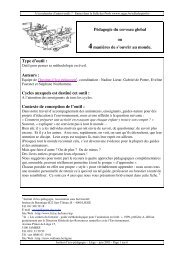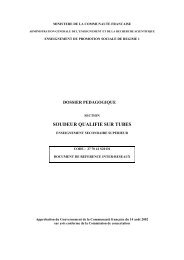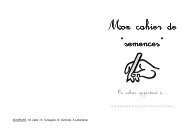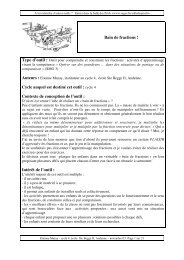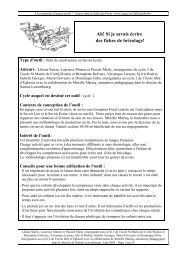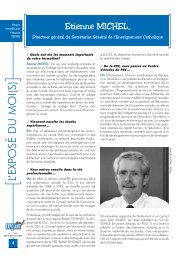Langues modernes (3) - SeGEC
Langues modernes (3) - SeGEC
Langues modernes (3) - SeGEC
Create successful ePaper yourself
Turn your PDF publications into a flip-book with our unique Google optimized e-Paper software.
MODULE 2 : L’ÉVALUATION À VALEUR CERTIFICATIVE : QUELQUES OUTILS.<br />
132<br />
Fiches de jeu de rôles (en français ou en langue cible)<br />
Rôle A Rôle B<br />
Tu téléphones à un(e ) ami(e ) qui vient<br />
chez toi samedi prochain et tu lui proposes<br />
trois activités possibles (cf. les annonces cijointes).<br />
Pour chacune d’entre elles tu lui<br />
expliques avec tes propres mots de quoi il<br />
s’agit, en quoi l’activité consiste, où elle a<br />
lieu et combien ça coûte.<br />
Décidez ensemble de ce que vous ferez.<br />
Tu décroches le téléphone et tu y entames<br />
une conversation avec ton ami(e ) chez qui<br />
tu dois te rendre samedi prochain. Il/Elle a<br />
quelque chose à te proposer et tu<br />
l’écoutes, ; tu peux bien sûr lui poser<br />
quelques questions.<br />
Exemple 2 :<br />
Compétences visées : lire pour parler : compréhension à la lecture / expression orale<br />
Source : Norbert Jacquinet - Etablissement Soeurs-Notre-Dame, Namur<br />
Niveau : 3 ème degré<br />
Situation de communication – tâche – consignes<br />
Préparation avant l’examen : chaque élève a choisi un livre dans une liste et l’a lu pour<br />
l’examen. Il ne sait rien de la situation de communication qu’il recevra avant de commencer<br />
son examen. Les élèves tirent au sort une des situations suivantes.<br />
Exemples de situations que l’on pourrait proposer<br />
Situation 1 :<br />
You are meeting the author of the book you’ve read. You will ask him questions about the<br />
novel. You will also tell him what you liked and what you didn’t like in the plot. You will also<br />
suggest ways in which he could adapt the story if it had to be made into a film.<br />
The author (played by the teacher) will also actively take part, interrupt you, react to your<br />
propositions…<br />
N.B. You must speak a maximum while answering the questions (more than a few seconds) and<br />
you may ask questions too.<br />
Situation 2:<br />
You’re meeting an English friend of yours (played by the teacher). You will convince him /her<br />
to read or not to read the book you’ve read. Don’t tell the plot but situate somehow the story,<br />
give your arguments for or against this book. Be ready to answer your friend’s questions.<br />
N.B. You must speak a maximum while answering the questions (more than a few seconds) and<br />
you may ask questions too.<br />
Situation 3:<br />
You’re taking part in a teenagers’ television programme about books. You will present the book<br />
you’ve read, starting with the summary (but don’t tell too much!), and giving your opinion<br />
about this book. The author of the novel (played by the teacher) will participate in the<br />
programme too. He will interrupt you, ask you questions and sometimes disagree with you.<br />
N.B. You must speak a maximum while answering the questions (more than a few seconds) and<br />
you may ask questions too.



